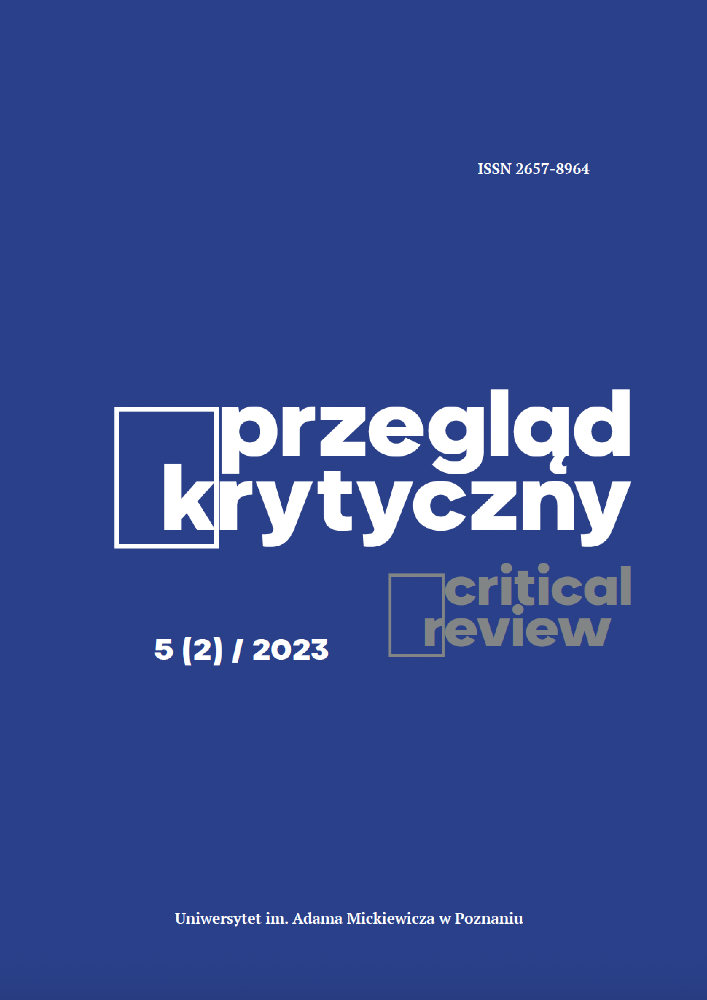Abstrakt
This paper explores the multifaceted concept of social development within economically advanced countries, delving into the implicit assumption of technological advancement as a cornerstone for well-functioning economies. While digital technologies shape broad socio-economic processes, a counterfactual perspective emerges when examining social development through the lens of (nature-based) social welfare. The analysis encompasses the coexistence of advanced technologies with disparities in living standards, resource appropriation mechanisms impacting both populations and environments, and the underexplored negative consequences of techno-economic development. The article addresses the visible and invisible impacts of information technologies, emphasising issues of labour exploitation, resource extraction practices, and the environmental costs of digital production. Critically assessing optimistic scenarios, the paper suggests the need to broaden discussions beyond the positive aspects of technology, considering the challenges for sustainable welfare posed by exploitative labour, resource extraction, and inequitable benefits. The study advocates for an inclusive approach to (nature-based) social welfare, encompassing marginalised issues and proposing concepts such as degrowth as potential solutions to the rapid development of information technologies and their societal implications.
Bibliografia
Artus, P. & Virard, M.-P. (2010). Wielki kryzys globalizacji [The Great Globalisation Crisis]. Warszawa: Instytut Wydawniczy Książka i Prasa.
Baranowski, M. (2019a). The Struggle for Social Welfare: Towards An Emerging Welfare Sociology. Society Register, 3(2), 7-19. DOI: https://doi.org/10.14746/sr.2019.3.2.01
Baranowski, M. (2019b). Sociology of knowledge in times determined by knowledge. Society Register, 3(1), 7-22. DOI: https://doi.org/10.14746/sr.2019.3.1.01
Baranowski, M. (2022). Nature-Based Social Welfare and Socially Responsible Consumption: Is Circular Economy a Viable Solution? In J. Bhattacharyya (Ed.), Dealing with Socially Responsible Consumers (pp. 33-50). Singapore: Palgrave Macmillan. DOI: https://doi.org/10.1007/978-981-19-4457-4_3
Baranowski, M. (2023). Critical theory of the energy transformation: Sociology’s approach. Society Register, 7(4), 7-20. DOI: https://doi.org/10.14746/sr.2023.7.4.01
Beck, U. (1992). Risk Society: Towards a New Modernity. London: SAGE Publications.
Beck, U. (2002). Społeczeństwo ryzyka: W drodze do innej nowoczesności [Risk Society: Towards a New Modernity]. Warszawa: Wydawnictwo Naukowe Scholar.
Bortolini, C. (2020). Trade war in strategic minerals. Le Monde diplomatique, July. Retrieved from: https://mondediplo.com/2020/07/08rare-metals
Bregman, R. (2016). Utopia for realists: The case for a universal basic income, open borders, and a 15-hour workweek. Netherlands: The Correspondent. (ebook)
Brynjolfsson, E. & Mcafee, A. (2015). The second machine age: Work, progress, and prosperity in a time of brilliant technologies. New York and London: W.W. Norton & Company. (ebook)
Cámara, J. A. (2023). Humanity Is Facing Its Sustainability: Will Technological Progress Make the Future Unsustainable? In E. T. Aznar & F. L. Castellano (Eds.), Science, Technology and Innovation in the History of Economic Thought (pp. 241-256). Cham: Palgrave Macmillan. DOI: https://doi.org/10.1007/978-3-031-40139-8_12
Castells, M. (1999). Information technology, globalisation and social development. Geneva: United Nations Research Institute for Social Development.
Castells, M. (2000). The rise of the network society. Oxford: Blackwell Publishers.
DeStefano, T. (2023). People may be more trusting of AI when they can’t see how it works. Harvard Business Review, September-October, 30-31.
Dolata, U. (2013). The transformative capacity of new technologies: A theory of sociotechnical change. Abingdon: Routledge. DOI: https://doi.org/10.4324/9780203070086
Dowbor, L. (2017). Co to za gra? Nowe podejścia do ekonomii [What is the game? New approaches to economics]. Warszawa: Instytut Wydawniczy Książka i Prasa.
Federici, S. (2019). Re-enchanting the World: Feminism and the Politics of the Commons. Oakland, CA: PM Press.
Hayami, Y. & Godo, Y. (2005). Development economics: From the poverty of the wealth of Nations. Third Edition. Oxford: Oxford University Press. DOI: https://doi.org/10.1093/0199272700.001.0001
Hirvilammi, T. & Koch, M. (2020). Sustainable welfare beyond growth. Sustainability, 12(5), 1824. DOI: https://doi.org/10.3390/su12051824
Kallis, G., Kerschner, C., & Martinez-Alier, J. (2012). The Economics of degrowth. Ecological Economics, 84, 172-180. DOI: https://doi.org/10.1016/j.ecolecon.2012.08.017
Kuznets, S. (1973). Modern economic growth: findings and reflections. The American Economic Review, 63(3), 247-258.
Lefebvre, H. (1991). Work and Leisure in Everyday Life. In H. Lefebvre, Critique of Every Life. Volume 1: Introduction (pp. 29-42). London and New York: Verso.
Long, X., Yu, H., Sun, M., Wang, X. C., Klemeš, J. J., Xie, W., ... & Wang, Y. (2020). Sustainability evaluation based on the Three-dimensional Ecological Footprint and Human Development Index: A case study on the four island regions in China. Journal of Environmental Management, 265, 110509. DOI: https://doi.org/10.1016/j.jenvman.2020.110509
Ngai, P. (2005). Made in China: Women Factory Workers in a Global Workplace. Durham and London: Duke University Press. DOI: https://doi.org/10.1515/9780822386759
Ngcamu, B. S. (2023). Climate change effects on vulnerable populations in the Global South: a systematic review. Natural Hazards, 118, 977-991. DOI: https://doi.org/10.1007/s11069-023-06070-2
Omoera, O. S. & Guanah, J. S. (2022). Climate change induced flash floods in federal capital territory, Abuja, Nigeria: Media shaping awareness? Przegląd Krytyczny, 4(1), 53-70. DOI: https://doi.org/10.14746/pk.2022.4.1.5
Piketty, T. (2022). Brief history of equality. Cambridge, MA and London: The Belknap Press of Harvard University Press. DOI: https://doi.org/10.4159/9780674275898
Rostow, W. W. (2000). The stages of economic growth. In S. K. Sanderson (Ed.), Sociological Worlds: Comparative and Historical Readings on Society (130-134). New York: Routledge.
Saikia, M. & Mahanta, R. (2023). Livestock, livestock loss and livelihood: a note on Mishing char dwellers of Assam. Society Register, 7(4), 57-70. DOI: https://doi.org/10.14746/sr.2023.7.4.04
Schneider, F., Kallis, G., & Martinez-Alier, J. (2010). Crisis or opportunity? Economic degrowth for social equity and ecological sustainability. Introduction to this special issue. Journal of Cleaner Production, 18(6), 511-518. DOI: https://doi.org/10.1016/j.jclepro.2010.01.014
Steyerl, H. (2023). Common sensing? New Left Review, 144, 1-12.
Sundberg, N. (2024). Tackling AI’s climate change problem. MIT Sloan Management Review, 65(2), 38-41.
Wetzer, T., Stuart-Smith, R., & Dibley, A. (2024). Climate risk assessments must engage with the law. Science, 383,152-154. DOI: https://doi.org/10.1126/science.adj0598
Zuboff, S. (2019). The Age of Surveillance Capitalism: The Fight for a Human Future at the New Frontier of Power. London: Profile Books.
Licencja
Prawa autorskie (c) 2023 Mariusz Baranowski

Utwór dostępny jest na licencji Creative Commons Uznanie autorstwa – Użycie niekomercyjne 4.0 Międzynarodowe.
W przypadku zakwalifikowania tekstu do druku Autor wyraża zgodę na przekazanie praw autorskich do tego artykułu wydawcy (zob. Polityka open access). Autor artykułu zachowuje prawo wykorzystania treści opublikowanego przez czasopismo artykułu w dalszej pracy naukowej i popularyzatorskiej pod warunkiem wskazania źródła publikacji.


